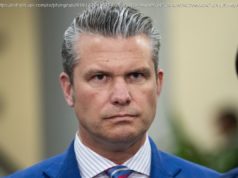Secretary of State Mike Pompeo came to Israel in the midst of escalating protests in Gaza, but he did not meet with Palestinian leaders and kept the policy focus on Iran.
TEL AVIV, Israel — Secretary of State Mike Pompeo came to Israel Sunday in the midst of the worst crisis in relations between Israelis and Palestinians in years, but he did not meet a single Palestinian representative and mentioned them publicly once.
For decades, American diplomats saw themselves as brokers between the two sides, and secretaries of state typically met Palestinian representatives on regional tours like this one. When relations between the two sides deteriorated, the United States sought to bridge the divide.
No more.
No one at the State Department called Palestinian leaders to ask for a get-together with Mr. Pompeo, according to Palestinian officials. And that may be because the Americans knew the answer they would have gotten: No.
Infuriated by President Trump’s decision in December to recognize Jerusalem as the capital of Israel, paving the way for the United States to move its embassy from Tel Aviv to the contested holy city, Palestinian leaders have cut off political contacts with the Trump administration. They say the White House can no longer be considered an honest broker in the Israeli-Palestinian peace process.
“There’s nothing to discuss,” said Xavier Abu Eid, a senior official of the Palestine Liberation Organization’s Negotiations Affairs Department.
In a remarks Sunday in Tel Aviv while standing next to Prime Minister Benjamin Netanyahu, Mr. Pompeo mentioned that the boundaries of Jerusalem should still be the subject of negotiations between the parties. “We remain committed to achieving a lasting and comprehensive peace that offers a brighter future for both Israel and the Palestinians,” he said.
But the escalating protests along the border between Gaza and Israel — which have led to hundreds of injuries and 46 deaths and have generated global sympathy for the Palestinian cause — went unmentioned.
“No meeting in Ramallah on his first visit sets an ominous tone about prospects for any progress, or even dialogue, with the Palestinians,” said Daniel B. Shapiro, an American ambassador to Israel during the Obama administration.
Aaron David Miller, a former negotiator for the United States in the Middle East, said Mr. Pompeo’s seeming indifference toward the Palestinians “at the very least suggests a casual disregard of the Israeli-Palestinian explosion that may be building and the U. S.’s inability or unwillingness to influence the course of events.”
Instead of discussing the Palestinian issue, Mr. Pompeo’s focused message on his sweep through the region has been a denunciation of Iran. He met with Saudi leaders on Saturday and Sunday morning, and they all agreed that Iran is a destabilizing force. He met on Sunday afternoon with Mr. Netanyahu, who blistered Iran alongside Mr. Pompeo.
And on Monday, he is scheduled to meet King Abdullah of Jordan in Amman, when Iran is again likely to be the most important subject of conversation.
In two weeks, Mr. Trump is expected to walk away from the Iran nuclear accord, which he has denounced as “the worst ever.” Countering Iran has become one of the few unambiguous policy themes of the administration.
Mr. Trump and his advisers disagree on how to confront Moscow. A potential trade war with China has caused deep unease across the Midwest. The administration’s policy on Syria is in flux. And North Korea’s leader, Kim Jong-un, is suddenly looking like a statesman.
But there is consensus that Iran needs to be opposed, and Mr. Pompeo hammered away at them Sunday.
“We remain deeply concerned about Iran’s dangerous escalation of threats to Israel and the region, and Iran’s ambition to dominate the Middle East remains,” Mr. Pompeo said beside a delighted Mr. Netanyahu. “The United States is with Israel in this fight. And we strongly support Israel’s sovereign right to defend itself.”
As for the nuclear accord, “President Trump made it pretty clear: This deal is very flawed,” Mr. Pompeo said.
“He’s directed the administration to try to fix it,” he said. “And if we can’t fix it, he’s going to withdraw from the deal. It’s pretty straightforward.”
Mr. Netanyahu agreed. “Mr. Secretary,” he said, “I think the greatest threat to the world and to our two countries — and to all countries — is the marriage of militant Islam with nuclear weapons, and specifically the attempt of Iran to acquire nuclear weapons.”
United States officials and international inspectors agree that Iran is abiding by the nuclear deal, which has substantially degraded the country’s ability to pursue nuclear weapons. Iranian officials have said the country may restart its nuclear program if the United States withdraws from the nuclear accord.
On May 14, the 70th anniversary of the establishment of Israel, the United States will formally open its embassy in Jerusalem, and a host of American dignitaries are expected. Mr. Trump has suggested he may come .
But that opening also coincides with the time that Palestinian protests are expected to crest, coming on the eve of the Palestinian commemoration of the Nakba, or “catastrophe,” when hundreds of thousands of Palestinians were expelled or fled their homes and became refugees during the hostilities surrounding Israel’s creation in 1948.
The first senior American official to feel the Palestinians’ furor over the Jerusalem decision was Vice President Mike Pence, who postponed what was expected to be an emotional visit over the Christmas holidays after several Christian leaders in the region refused to meet him. When he finally made it in January, the Palestinian Authority, led by President Mahmoud Abbas, boycotted him.
Since nothing has been done to assuage the Palestinians in the meantime, Mr. Pompeo could have expected the same treatment.
“We refused to see Mr. Pence twice,” said Nabil Shaath, an Abbas adviser on international relations. He added: “We have declared our position and we don’t accept an American role in unilaterally controlling the peace process. To us, Trump is irrelevant, whether he announces the deal of the century or not.”
On Monday, the Palestine National Council, the P.
Домой
United States
USA — Political Pompeo and Palestinians Have ‘Nothing to Discuss’ Amid Gaza Crisis






